Approach to the Wide Complex Tachycardia: Difference between revisions
Jump to navigation
Jump to search
No edit summary |
No edit summary |
||
| Line 44: | Line 44: | ||
==Examples== | ==Examples== | ||
<gallery> | <gallery> | ||
Image:wide_qrs_tachy_AAM1.jpg|Wide complex tachycardia. No AV dissociation. RBBB. Resembles sinus rhythm from the same patient. | Image:wide_qrs_tachy_AAM1.jpg|Wide complex tachycardia. No AV dissociation. RBBB. Resembles sinus rhythm from the same patient. Conclusion: SVT with [[RBBB]] | ||
Image:wide_qrs_tachy_AAM2.jpg|ECG from the same patient in sinus rhythm. The QRS complex is very similiar. | Image:wide_qrs_tachy_AAM2.jpg|ECG from the same patient in sinus rhythm. The QRS complex is very similiar. | ||
Image:wide_qrs_tachy_AAM3.png|Wide complex tachycardia. LBBB configuration. Absence of RS in the chest leads. [[AV dissociation]] is present. Conclusion: [[VT]] | Image:wide_qrs_tachy_AAM3.png|Wide complex tachycardia. LBBB configuration. Absence of RS in the chest leads. [[AV dissociation]] is present. Conclusion: [[VT]] | ||
Revision as of 22:23, 27 January 2010
During wide complex tachycardia (heart rate > 100/min, QRS > 0.12 sec) the differentiation between supraventricular and ventricular origin of the arrhythmia is important to guide therapy. Several algorithms have been developed to aid in this differentiation (below). It is important to keep in mind that a good estimate of VT versus SVT can be made based on the clinical vignette:
- 'Horizontal entrance' into the ER. Older patient with previous myocardial infarction = most likely VT
- Younger patient with known paroxysmal tachycardias and who is hemodynamically stable = most like SVT
The ACC algorithm ACC
Brugada criteria
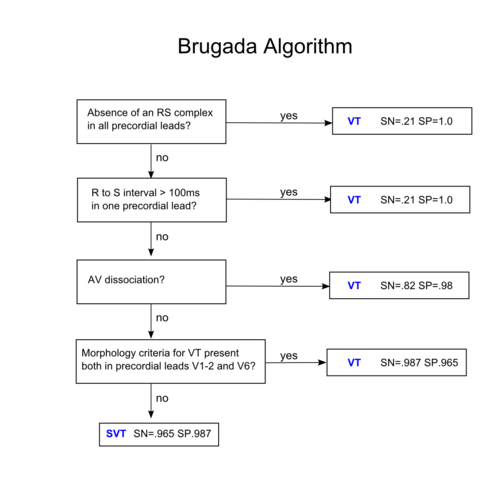
| Morphological criteria (if the above criteria are inconclusive) | ||
|---|---|---|
| LBBB pattern | ||
| Initial R more than 40ms? | Yes => VT |  |
| Slurred or notched downwards leg of S wave in leads V1 or V2 | Yes => VT | |
| Beginning of Q to nadir QS >60 ms in V1 or V2? | Yes => VT | LR >50:1 |
| Q or QS in V6? | Yes => VT | LR >50:1 |
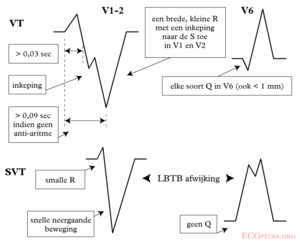 | ||
| RBBB pattern | ||
| Monofasic R or qR in V1? | Yes => VT | |
| R taller than R' (rabbit-ear sign)? | Yes => VT | LR >50:1 |
| rS in V6? | Yes => VT | LR >50:1 |
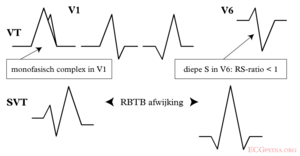 | ||
Vereckei algorithm Vereckei
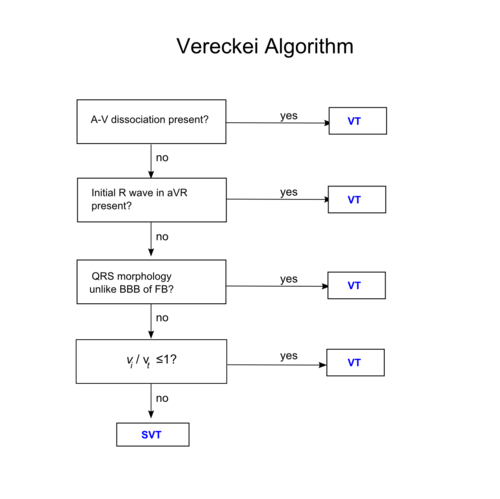
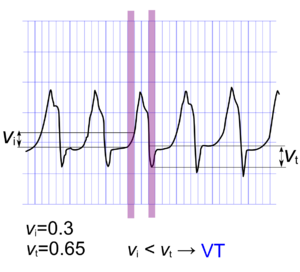
Examples
-
Wide complex tachycardia. No AV dissociation. RBBB. Resembles sinus rhythm from the same patient. Conclusion: SVT with RBBB
-
ECG from the same patient in sinus rhythm. The QRS complex is very similiar.
-
Wide complex tachycardia. LBBB configuration. Absence of RS in the chest leads. AV dissociation is present. Conclusion: VT
-
Wide complex tachycardia. LBBB configuration. Absence of RS in the chest leads. AV dissociation is present. Conclusion: VT
Referenties
<biblio>
- ACC pmid=14563598
- Brug1 pmid=2022022
- Vereckei pmid=17272358
</biblio>

